Find Your Dream Team with Christiamilda Correa
Christiamilda Correa: And we’re talking about nature. I remember this idea of the flock of birds, how they go together and they’re in unison, right? That’s how we can look like too, we can all be in flight together.
Chorus: [sings “Remember”]
Yura Sapi: Welcome to season three. Welcome to our liberation. Welcome to the Building Our Own Tables podcast. The Building Our Own Tables podcast is produced for HowlRound Theatre Commons, a free and open platform for theatremakers worldwide. This is Yura Sapi here to support you on your journey of creation towards our collective liberation. How exciting is it to transform our future, and be the future ancestors we’ve dreamed for? May you receive that which supports you on your journey and release that which does not. The universe expands as we do. Nature evolves as we do. We remember. We remember. We remember.
Chorus: [sings “Remember”]
Yura Sapi: Let us call upon the four elements that support us: The fire that burns within igniting our imagination, our ability to see into the future. The water that holds us and holds within our memory. The air that lifts us up and carries our stories across to meet each other. The earth, which provides us sustenance, repair. To support us on this journey, let us welcome in all of our ancestors.
We’re learning from visionaries who have built their own tables, receiving gems of wisdom to support us along our journey. In today’s episode, I interviewed my co-founder, Christiamilda Correa. Together with our board, we created LiberArte, a U.S. non-for-profit arts organization. And I’m so grateful we got to share a bit about how we interact, how we hold space, how we first met and we also share a special writing prompt that can help you recenter, ground yourself, and bring your dreams into reality. Enjoy.
Christiamilda: Thank you so much, Yura Sapi. It’s such a pleasure being here today. My name is Christiamilda Correa. I go by Christie. My pronouns are she/her/ella. I’m here in the Munsee Lenni-Lenape land, also colonially known as New Jersey. I really have to thank the way that we were introduced to one another. The Latinx Theatre Commons, the LTC, is celebrating ten years. We had the opportunity to connect there for the first time during one of the cafecitos, and I remember we went out to eat informally and caught up and shared about our projects. I was working at a nonprofit at the time. You were getting a degree. Really what struck me was your passion for the arts, your passion for creating community and we shared in that together and said, “How can we help each other rise?” So it’s been a beautiful partnership ever since.
Yura Sapi: Thank you. It’s a pleasure to share space with you. We’re talking about some projects, initiatives and nonprofit even that we’ve started, created together. Really beautiful offering to be able to share in this way some of the practices we’ve put into place of working with each other and others that we welcome in.
Christiamilda: When I found the LTC, I was in a space of exploring identity and wanting to grow professionally, but the idea of leadership and what that meant, and over time I’ve come to learn that anyone can become a leader. Leadership’s really about trust, humility, holding space for other people’s brilliance. In these affinity spaces, being able to find comfort and accountability with others to help realize the variety of visions, missions, values, whatever personal projects or organizational projects that we’re working on, being able to build community with each other. And that’s really the power of the theatre, of the arts. Not only are we visionaries in that sense; we dream it and we do it. I wanted to also highlight some of the work that you and I have been doing with the Strategic Planning Institute, how we’ve been able to offer that to some folks as well and helpful and intentional spaces for planning, for creating, for ideating.
Yura Sapi: Honestly, yeah, thanks so much to the LTC for creating these spaces for the people of the group, really, that come together and make something. HowlRound connected to that and the support, it’s connected, always all connected. I think that just goes to show the relationships that end up getting developed and the beauty of time flowing with us and supporting us.
Christiamilda: It’s that recognition that we’re all in this together that helps restore that balance in many senses because we’re all bringing something to the table. Some of us may be going out in the streets and marching and there are others of us who are creating these community spaces. I’ll speak to the work that I’ve been doing with the NYU Latinx Alumni Network. I’m one of the founders and I’m currently the president, serving my final term, and one of the reasons we created that space was because many of us went to this institution, whether we were first generation or came from various circumstances, what we shared was this culture. Some of us had a shared language.
That’s how we identified, and we said, “How do we create different topics that’ll help us heal, especially in this moment of time?” We said, “Let’s create community-centered space where we can reset, restore.” And so, in partnership with our collaborator, Amanda Sabater, fellow leader in the group, we created this series talking about mental health. We just hosted a body positivity series a few weeks ago and we had a doctor from Nicaragua talking about health at every size. We’re trying to destigmatize many of the things that we grew up with thinking that we needed to conform to, and we can rewrite that story, we can retell that narrative.
Yura Sapi: Yeah. The Strategic Planning Institute is this annual space that we’ve been curating and cultivating for visionaries, for folks who are taking on this role as a leader, whatever that might mean and manifest as, and supporting them in this early tender stage of creating a new initiative, a project, maybe developing an idea into something, into reality. Maybe it’s something within another larger space or project that they’re already working on, maybe it’s also just a simple plan for themselves going forth along their career, along their artistry. There’s this part where at the end, one of the closing sessions, we talk about community accountability and accountability partners. These partners in accountability are really about helping accomplish something and that’s how we end up having these circles around each other.
That energy of rage and wanting to bring about a change, and another side of that that is ending up talking about the love and the way in which our community accountability is thriving and is about holding each other up and going forth towards something that we are working towards and the liberation that we are working towards because sometimes it does feel like we can get a little bit caught up, at least for me, in the despair and in the anger of it all. It’s about making sure that it’s not then taking a step backwards by falling into those same patterns. It’s really helpful to be able to be like, “Okay, it’s not that and it is this,” and finding the people that we are working towards together to accomplish our shared goals.
Time is not linear. You are not alone. You are never alone. We’ve been through this cycle before. We’re working from the power of our past fighters from before and time isn’t linear. Connections happen for a reason. There’s a reason I am here where I am. So bask, indulge, refuge in the happenings of now, the happenings of past which will guide to the future, which is also really the past. The Building Our Own Tables podcast is produced in partnership with Advancing Arts Forward, a movement to advance equity, inclusion and justice through the arts. We create liberated spaces like this one that uplift, heal and encourage us to change the world. Check out advancingartsforward.org to see our gatherings, courses, coaching, and artist residency program. You can also donate to support this podcast in other spaces.
Christiamilda: I also wanted us to talk about the other ways that we’re leading and we’re adding to the conversation. It’s been such a pleasure, Yura Sapi, working with you over these past several months on launching LiberArte. Yeah, yeah, a U.S.-based nonprofit and it builds racial, social, and climate justice worldwide through empowering artists and creative activists with networking, educational programs, and direct aid.
Yura Sapi: Yeah, it’s such an exciting time; beautiful growth, planting of seed time. Experiencing the roots coming out and connecting with other seeds and other roots, other trees and plants partnering. It’s really opening us up to so much more that we’re going to be able to do and support. I think a big thing about the Latinx community of the U.S., the Latina community, Latino, Latina, Hispanic, naming all of the countries that consist of that too, our Indigenous heritage, our Indigenous truths and ancestors and community are African descendant, Black community ancestors.
Christiamilda: Mm-hmm.
Yura Sapi: White community, European descendant ancestors, all in that honoring to the role we play, the history that has happened, all of folks’ stories of coming to the U.S. and being able to give back, supporting folks around the world. We’re really opening it up to the whole world for folks in the future to collaborate with us. The using of this privilege of the U.S. access connections and also the solidarity that we get to build globally by being able to welcome artists to visit and study in different artist residencies and programs in other countries, learning from maestros and maestras, sabedores, wise elders of different traditional music and dance, storytelling and craft to really decolonize this understanding that our education, our artistic learning has to come from the academic world and so much more to work on, whether it’s grants—like medical grants for artists—international arts festivals that we can be a part of and help bring attention to and bring artists from the U.S. to.
And then all of our virtual programming that we do and have been doing the like Strategic Planning Institute and other workshops like Self-Care is Self-Love for the Revolution, the Building Our Own Tables podcast—so really being able to offer all resources and connections and solidarity in these different ways that folks can interact and also welcoming all that is to come, all the connections and collaborations that we can have under this mission, under this very explicit anti-racist, decolonizing, and support of reconnecting with the Earth mission. So just super grateful, taking this moment to be grateful for all that’s come to lead to this moment and for all that is going to come as we give and receive, to give what we can and receive back from the community what we need.
“Look at those who are already doing this work and see what serves you and see how you can learn from each other and continue on.”
Christiamilda: So much that LiberArte is already offering internationally and locally and hopefully we’ll be able to further our connections with other groups and individual artists who are ready to take their mission to the next level.
Yura Sapi: It’s really about the energy that we’re exchanging and the way that we hold space for others and welcome others into the process. It’s like a feeling that you feel more than the words—though the words are important. It’s a part of how we share and welcome more and articulate through the language we have. What are some of the practices you would like to share with someone who’s looking to build their own table?
Christiamilda: Writing down ideas on a piece of paper, maybe listing out the top twenty-five, choosing three of them and focusing on them and breaking down those goals. Something that I’ve really found successful, especially when I was looking to find community, find others with shared values, it turned out to be artists, really, it was seeking out those spaces. So I was introduced to the LTC, David Mendizábal, a close collaborator. We went to school together. I was on the leadership team of the Movement Theatre Company at the time. I said, “Wow, I really want to meet other Latiné folks; Latinx.” And he said, “Have you heard about these folks?” I said, “No.” He’s like, “Come on through.” That really opened me up because even hearing the stories of those who’ve been established, who’ve been creating the stories, Josefina López, Migdalia Cruz, etc., and being in the space sitting next to them and being able to turn around and say, “Hello.” I’d never been in a space where that was possible. Seeing these giants in the field, they were peers in that moment, in that space where we could ask each other things.
For those who are looking, create your own. Find a collaborator or two, set out about doing the business of creating it. And it could be as simple as turning on a podcast recording like this one, sharing your story, creating an Instagram account, and chronicling your story visually for others. Look at those who are already doing this work and see what serves you and see how you can learn from each other and continue on. I felt success in that, right? It doesn’t always have to fall on one person’s shoulder to move the needle. There are many people already doing the work and think about what your role is in that, what role you would like to have because we’re all blessed with so many gifts.
Yura Sapi: We work with the idea of vision and mission in the institute, decolonizing that too because I learned that from my graduate program, this understanding of organizational mission and vision, which one time in a session someone was like, “Yeah, that’s traumatic because so many nonprofits have a mission and that’s not really one thing what they’re doing.” So it’s really a decolonization of that and remembering of what that really means, being able to have envisioning moments, do a little bit of time travel and meditate and have creative visualizations on what is it that we want for our liberated future, being able to experience it through a way that is in your mind’s eyes, through seeing, hearing, feeling, smelling. That also is super connected to the arts in the way that we’re able to bring about these other worlds and have the impossible become possible and even represented in front of us.
We work with this decolonized understanding of what envisioning, of what looking towards our liberated future, of what calling that fourth and manifesting that can be. Similarly with the mission, really talking about: What is my purpose on Earth? What is my reason that I’m here? What am I here to support? How am I meant to be creating, helping towards this vision, this idea of purpose, this idea of envisioning to manifest, really taking that into these Indigenous knowledge type of practices. There’s a reason that we do learn a lot of things through these programs, through these academic world programs and capitalistic life and jobs. There are things that have been hidden, put into the code from really source stuff from our ancestors of long ago, and there’s a reason why we get to experience them. I think about my theatre training and I realize that there are so many practices of embodiment and ultimately Indigenous wisdom that I was able to have access to, and I know that there’s a reason why I was guided to do this to get that information.
Christiamilda: Yeah, absolutely. It’s really wonderful to see the shift even happening in education, especially how these courses are being taught. Hopefully being more inclusive of some of our ancestral traditions, especially through BIPOC lenses. And I certainly know in my experience, that certainly wasn’t the case. Even having folks who reflected the community that I lived in was unavailable. At the time at this point as an adult, finding those who are, finding those who want to reconnect with some of their traditions or reimagine what their culture is, it’s an exciting time and necessary, actually, healing for all of us.
Yura Sapi: And the beauty of transformation is that it’s something that changes in a way that is not changing back, that it’s something new, that with every death comes a rebirth and to have a rebirth, we do need a death, an end to something to start something new.
Christiamilda: And the cycle continues.
Chorus: [sings]
Yura Sapi: We do a lot of writing and drawing and reflecting in our work with the Strategic Planning Institute and also even with the nonprofit in our preparation and work. I love how it ends up being a connection to nature always when we write handwritten stuff and on a page that is a tree, we have the support of a tree with us. And there’s ways in which we’re able to write or record things that doesn’t have to be linear. We can welcome in drawing and symbols and poems. I wonder if there’s an offering we can give to folks, a practice we can do right now.
Christiamilda: Yeah, that’s a great idea. Well one that comes to mind is this idea of challenge, right? What was a challenge that turned out to be an unexpected blessing? And we’re talking about nature. I remember this idea of the flock of birds, how they go together and they’re in unison, right? And just that visual representation that all of us, when we come together and we build communities, we build spaces, we do it together. When it’s in harmony, that’s how we can look like too. We can all be in flight together toward whatever this vision is.
Yura Sapi: What was the challenge that turned out to be an unexpected blessing? And we were like, “Free write here, draw, record, however that works out for you.” The offering that we can allow, the pen, the writing utensil, the paint brush, whatever you choose, to flow the information out, trusting our instincts, things that we might want to highlight through what comes out afterward. What is a challenge that ended up being a blessing that you need to remember right now in this moment? What is that? Take five minutes here and journal and then come back and if you’re in a place where you can’t journal right now, you’re welcome to take the time to think about it, to allow it to experience in your body maybe. Where do you have memory that may come up in your body? Again, the challenge that ended up being a blessing.
And about another minute allowing for the information to flow out, knowing you can always come back to this practice in question.
That was really cool. That was really helpful for me.
Christiamilda: Me too. That was great. I’m glad we created that space in this form.
Yura Sapi: Yeah. I can share a little bit about what came up for me.
Christiamilda: Mm-hmm.
Yura Sapi: I ended up focusing on the challenges that I used to encounter in city life. So the first thing that came to mind was having mice in my apartment when I was living in Boston. And so that was, I guess, the clue there to keep going down this understanding of city life, of all of the hustle and bustle, the trains, the subways, the amount of people that I’m interacting with on a day-to-day basis and feeling their energy as someone who’s realizing that I’m able to connect deeply with the energy of others, realizing that those challenges are no longer my challenges, that I’ve been able to really take into consideration more of the support I need in the ability to care for myself.
And this hustle and bustle and what really ended up being the representation of city life in my work, in my life is really about the idea that I need to suffer in order to get what I need, that the way that I work ends up being a suffering to the extent of just overworking, working all night, and sacrificing things like rest to be able to feel accomplished and to feel that I’m doing what I need to get what I need—overcoming those challenges and that mindset really because ultimately, it’s coming from myself. In the end, it’s my decision of how my free time is my choice and being able to shift that mindset, be less in the capitalism and acknowledging the new challenges that come. There are new challenges that now come with that. There’s sometimes these, I’m calling them the false comforts of capitalism, fast food for an example.
It’s like, “Oh, yeah,” it’s maybe easier to get a meal that is cooked quickly somewhere else versus cooking at home with more natural grown ingredients or even growing my own plants and eating them, it’s a different thing. But ultimately, it’s not good for the environment. It’s not good for me. When I’m eating, it’s a false comfort of being able to have a quick fast meal in that way. From the beginning, it was a message around the light, being able to be in darkness, to call upon your light. And that in darkness offers this opportunity to be the light for ourselves, for others, and to just radiate and work on expanding the light. When it’s all light, I’m not recognizing it as important to be cultivating this energy, this love, really. And so the moments of darkness allow for the light to grow and to be called upon.
That’s a really important message for me now because especially now with the new nonprofit and this role as a leader, as someone who is guiding, making decisions, and deciding, too: What am I doing with my days? How am I working on all the different things that we have wanting to get done? Allowing for that grace, that care for myself, for that reminder that it’s not about suffering to get what I need. I don’t need to suffer to get what I need and that there are new challenges that I’m encountering, and so being able to overcome these challenges is about being able to get to the blessings that come afterwards, the invitation to keep working through the challenges of today in order to receive the blessings of tomorrow.
Christiamilda: That was beautifully put. Thank you for sharing that. Many of those sentiments resonated with me still here in the city and pushing away from a lot of those pieces of the hustle and bustle mentality and the culture. Absolutely.
Yura Sapi: Yeah. I do believe it’s possible, you don’t have to get caught up in it all.
Christiamilda: Yeah. I was thinking of the sentiment, in my culture, there’s this phrase that goes, “Calladita se ve más bonita.” And that’s translated in, “You look more pretty when you’re quiet.” That was said to a lot of girls or your young people just to keep them quiet essentially, right? And in many ways I internalized some of that. And also I found myself pushing against that because inside I always knew, I said, “You don’t know me.” Just because I’m not boisterous or causing a ruckus, it doesn’t mean that what I have to say should be dismissed. So over time, I’ve been disrupting that in small ways for myself. Earlier, we talked about showing up, right? Sometimes it’s just about going to the meeting or creating a space and saying, “Hey, this is what I want to work on, who’s with me?” And putting it out there. And I found success in that, really, being able to show up as I am in that day, being present and that consistency even, right?
Folks start to realize, “Oh, hey, so-and-so is here today and they’re here again.” That reliability, just being able to be present and in all the forms, right? Listening deeply, I’ve learned that the challenge of maybe being calladita, being a little bit of a quieter personality at times, has allowed me to understand just by taking in the essence of the person and what’s the message they’re trying to communicate, right? What’s the need? As it relates professionally as an artist, I go into spaces through the many hats in addition to leading different volunteer organization groups, I’ve also been blessed to be able to create events, events for thousands of people. In Houston, Texas, I had the opportunity to produce an installation and we had forty thousand high schoolers learn about different topics that affected those in that community, including immigration, homelessness, about their right to vote, and many of those high schoolers came from conservative towns and maybe didn’t know about LGBTQ+ identities.
The task was being in this twenty-five-thousand-foot space and thinking how can we transform this with art and interactive engagements to tell the story of communities and identities in the Houston area and honor those voices creatively? I invited a local Indigenous artist, Aztec dancers, and they did a performance. I also had a storyteller—actually from the LTC—playwright come in and people wrote their story about their origin story of their family, and he spoke about being an immigrant. And people were in a circle and shared that story. And we also had people run with a basketball up and down a line and answer trivia questions, so silly things like that. Being able to imagine these empty spaces, envisioning it and then actually creating it. And that was such a privilege. So again, from being this quiet kid growing up in the city to being tasked with the ability to tell the story of communities who may not traditionally be heard and giving voice to that, that is such a privilege.
So I wanted to share that in this space that all of us are called to do something, so what is it that you’re called to do? What may seem like a challenge, maybe I keep thinking of the... it’s such a silly movie, Romy and Michele’s High School Reunion—if you haven’t seen it, it’s such a throwback. But anyway, maybe they were the outcast or whatever, the grounding of it is, we’re all called to do something really special and I hope that whatever you consider is a challenge for yourself right now, that over time you step into the spaces, you show up and you’re present and you let folks know, “Hey, this is who I am,” as quietly as you need to or as loudly as you need to, and you do the work with each other. So that’s my offering.
Yura Sapi: This podcast is produced as a contribution to HowlRound Theatre Commons. You can find more episodes of this series and other HowlRound podcasts on iTunes, Google Podcast, Spotify, and wherever you find podcasts. Be sure to search and subscribe to receive new episodes. If you love this podcast, post a rating and write a review on those platforms. This helps other people find us. You can also find a transcript for this episode along with a lot of other progressive and disruptive content on howlround.com. Have an idea for an exciting podcast essay or TV event the theatre community needs to hear? Visit howlround.com and submit your ideas to the commons.
This is Yura Sapi. You can find out more about me at yurasapi.com or follow me on Instagram or LinkedIn at Yura Sapi. Thanks for joining us.

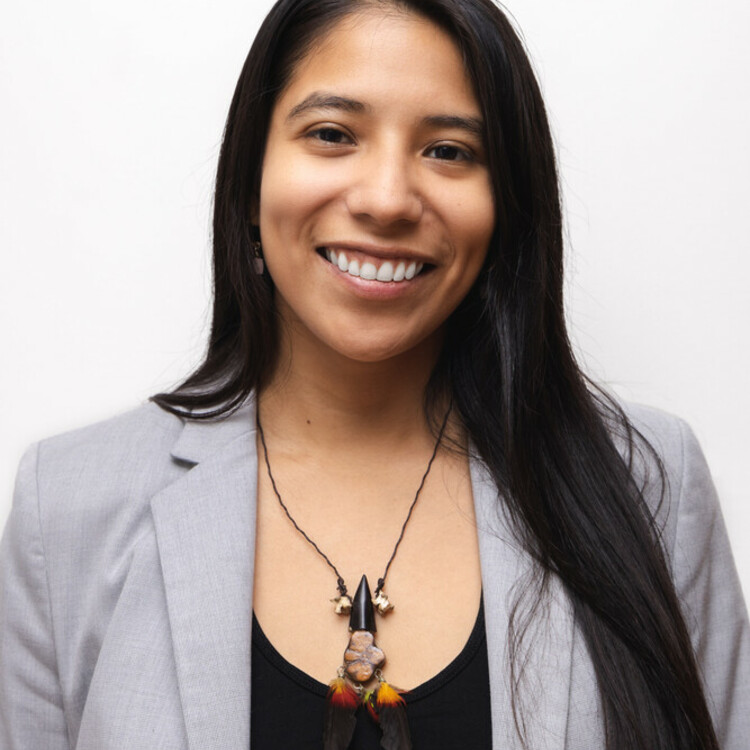
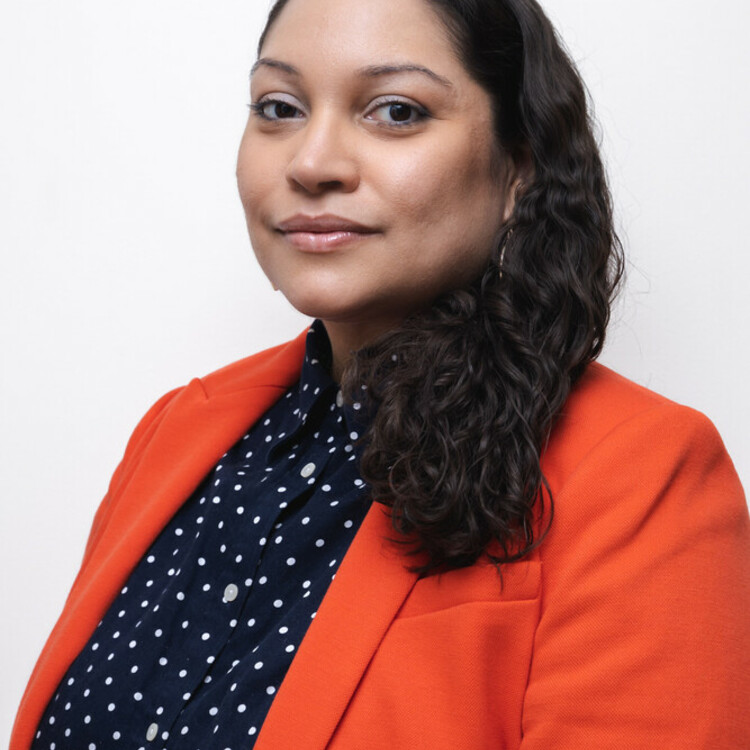
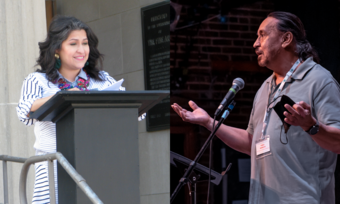


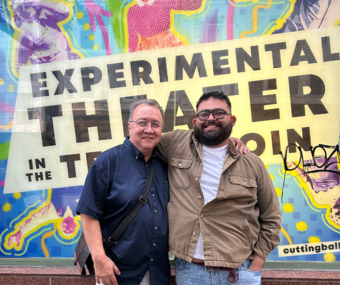


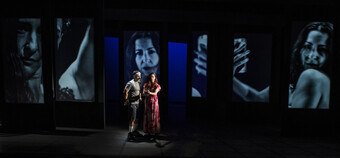


Comments
The article is just the start of the conversation—we want to know what you think about this subject, too! HowlRound is a space for knowledge-sharing, and we welcome spirited, thoughtful, and on-topic dialogue. Find our full comments policy here